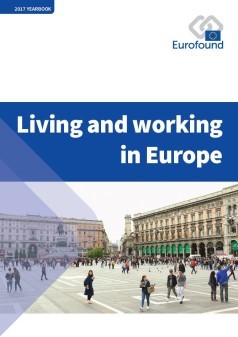Work TV
Watch our TV Channel dedicated to the ‘World of Work’. Explore our video library for informative videos featuring career opportunities at leading companies, franchising opportunities, further education and recruitment professions and their services.
Simon Collyer
Pimlico Plumbers Lose Again, This Time in The Supreme Court
The Liberal Democrats have welcomed today's ruling by the Supreme Court categorizing Pimlico Plumbers' employees as workers rather than self-employed, meaning they are entitled to basic employment rights such as holiday pay. The ruling is likely to have a knock-on impact on ongoing legal battles against other prominent businesses in the gig economy such as Uber and Addison Lee.
Speaking following the ruling, Liberal Democrat Work and Pensions spokesperson, Stephen Lloyd MP, said:
“The Supreme Court has made it clear: if a company has its grip over how you work, how you are paid and who you can work for, you are not self-employed. But workers in need of protection should not have to be dragged to the highest court in the land in order to get it.
“We need a new settlement for the gig economy, building on the Taylor Report. The Government should create a new employment status of ‘dependent contractor’ and a higher minimum wage for hours not guaranteed in their contract, forcing unscrupulous companies to think again about their employment structures.
“Universal Credit and pensions products also need overhauling so that the safety net works for the gig economy too.”
ABC Comment: The background to the case was, that Gary Smith, a tradesman, who had been working for Pimlico Plumbers for over five years. While his contract described him as self-employed, Smith argued he should be classed as a worker because he wore the Pimlico Plumbers uniform, drove a branded company van and took orders from the control room. This, he argued, meant he should be entitled to holiday pay, protection against disability discrimination and unfair wage cuts. Lord Wilson of the Supreme Court said Smith should be classed as a worker because his contract with Pimlico enabled the company to “exercise tight administrative control” over him and “impose fierce conditions on when and how much it paid to him”. He was a 'dependant worker' in other words. The case represents the first occasion that the Supreme Court has ruled on the gig economy and will no doubt set a precedent. A similar case involving two Uber drivers will be heard later this year.
Pimlico Plumber's chief executive Charlie Mullins predictably said he was “disgusted” with the decision. “It can only lead to a tsunami of claims” against the thousands of firms that employ millions of contractors, he said.

ABC Note: Pimlico Plumbers predictably lost their case in the Supreme Court, no one was particularly suprised. .
ABC Comment: Are you self-employed or a worker?

Colchester Job Fair June 20th 2018
Do visit our ABC Event section. We had recently re-coded the area and we are adding more events all the time: http://www.abcorg.net/events
The Colchester Jobs Fair is on the 20th June 2018, at the Town Hall between 10am and 1pm.
It is a good idea to bring copies of your CV with you as between 20 - 25 companies will be recruiting on the day.
To get information on exhibitors attending or to express your interest in booking a stand, please email This email address is being protected from spambots. You need JavaScript enabled to view it.
This email address is being protected from spambots. You need JavaScript enabled to view it.
Image: Colchester Town Hall
It is free to attend with no registration required for all prospective jobseekers.
The event is run by Job Fairs:

ABC Comment. Have your say about Colchester Job Fair below.

Job Fair - Wandsworth, 15th June 2018, at the Civic Suite
Wandsworth are holding a Job Fair at the Civic Suite on the 15th June 2018, at the Civic Suite between 10am and 2pm.
It is a good idea to bring copies of your CV with you as between 17 - 25 companies will be recruiting on the day say the organisers.
It is free to attend with no registration required for all prospective jobseekers.

Image: Wandsworth Job Fair at the Civic Suite.
ABC Comment: Are Job Fairs beneficial? Have your say below.

£90.3 Billion Saved Into Workplace Pensions in 2017
Eligible employees saved a total of £90.3 billion into workplace pensions in 2017, an increase of £4.3 billion on the total amount saved in 2016, according to research by the Department for Work and Pensions (DWP).
Workplace pension participation and savings trends of eligible employees official statistics: 2007 to 2017, published on 5 June 2018, also found that 84% of eligible employees were participating in a workplace pension in 2017, and 73% had saved into workplace pensions in at least three of the last four years.

ABC Comment: What do you think about workplace pensions? Please Comment below.

The National Autism Show(s) *Three, Kick Off Shortly
The national event for autism, offers more information, help and advice on autism (including Asperger syndrome) than anywhere else in the UK.
At 'The Autism Show' you can choose from over 100 hours of talks, clinics and workshops plus hundreds of specialist products and services say organisers which can make an immediate difference to those you care, support or teach.
SHOW INFO
The Autism Show: ExCel Exhibition Centre, One Western Gateway Royal Victoria Dock, London, E16 1XL, United Kingdom
Opening times
Friday 15 June: 10:00am-5:00pm
Saturday 16 June: 10:00am-4:00pm
The Autism Show: NEC Birmingham, Hall 8, Pendigo Way, Marston Green, Birmingham, West Midlands B40 1NT
Opening times
Friday 22nd June 2018 10.00am – 5.00pm
Saturday 23rd June 2018 10.00am – 4.00pm
The Autism Show: Eventcity, Hall 1, Phoenix Way, Off Barton Dock Road, Urmston, Manchester M41 7TB
Opening times
Friday 29th June 2018 10.00am – 5.00pm
Saturday 30th June 2018 10.00am – 4.00pm
ABC Note: What do you think of theses shows. Do add your comments below?

Eurofounds Interactive Living and Working in Yearbook 2017
The number of people active in the labour market is at an all-time high, ratings for key public services are increasing and there is a marked recovery in trust in national institutions in many Member States, these developments are detailed in Eurofound’s Living and working in Europe yearbook for 2017.
It also highlights a continent in transition, where there is an imbalance in opportunities for prosperity, and quality of life, depending on where you live.
The Living and working in Europe yearbook provides a snapshot of the working lives, employment circumstances and living conditions of people in Europe in 2017. It describes trends and transitions in the areas of labour market change, industrial relations, working conditions and sustainable work, quality of life and public services, the digital age, and convergence in the European Union.
Employment growth beat expectations in 2017, with more people than ever before employed and active in the labour market. However, when the numbers of unemployed people, involuntary part-timers and inactive people who are willing to work are considered – over 40 million people in all – the supply of labour currently well outstrips demand. With an ageing population and declining fertility rates, the need to reintegrate these groups into the labour market is becoming increasingly urgent.
The issue of working time also receives attention in the yearbook. Policies in this area need to take account of workers’ differing needs over the course of their lives. People are most likely to want to reduce their working hours when they are parents of young children and when they are approaching retirement. At the same time, the lack of work–life balance is most pronounced during these two periods. Better work–life balance has an implicit societal value linked to gender equality and quality of life. It could also boost labour supply by removing a barrier for those who find it difficult to reconcile rigid working arrangements with family commitments.
Finally, the yearbook gives significant attention to quality of life in Europe. Overall, there has been progress in quality of life, quality of society and quality of public services and people in Europe are generally optimistic about the future. However, it should be emphasised that this improvement in not in all Member States and not for all social groups – evidence that Europe is yet to fully kick into gear as an engine for social convergence.
ABC Note: Do visit this interactive website.
ABC Note: Are we better off in Europe? Have your say below:

Universal Credit Introduced in Belfast Areas
Universal Credit will begin in the first areas of Belfast from Wednesday 13 June.
It will be available for new claimants in the Falls and Shankill areas from that date. Andersonstown will go live from 27 June.
Universal Credit replaces six existing benefits with one and is for people of working age (18 - state pension age). People already claiming these existing benefits will not be affected until July 2019 at the earliest, unless their circumstances change.
David Sales, Universal Credit Programme Director, Department for Communities, said: “Universal Credit is being gradually introduced across Northern Ireland. The phased rollout began in September 2017 and is already operational in 17 areas across Northern Ireland. This means we have been able to closely manage and learn from the rollout to date.
“So far in the areas that Universal Credit has been introduced there has been over 9,000 claims made. Advance payments are offered to all claimants, and to date 50% have accepted one. Our work coaches are actively working to support each of these claimants to enter employment, earn more or prepare for work in the future.”
As Universal Credit arrives in an area, new services will be on offer in the local Jobs and Benefits Office. A new digital zone will be available, with access to free wifi and PCs. Fully-trained staff are on hand if new claimants need any help through the process of making their claim online.
Universal Credit replaces Jobseeker's Allowance (income based), Employment Support Allowance (income-related), Income Support, Housing Benefit (rental), Working Tax Credit and Child Tax Credits for people aged over 18 and under State Pension age.
Existing claimants of these benefits will transfer to Universal Credit between July 2019 and March 2023. Some claimants will naturally move to Universal Credit earlier, where their circumstances have changed.
Further information on Universal Credit and full details of the rollout are available on the nidirect website:
Universal Credit will also begin in Banbridge on 27 June. The rollout will continue from September, reaching the remaining areas of Belfast as well as Ballynahinch, Newtownabbey, Newtownards, Carrickfergus, Bangor, Lisburn, Larne, Cookstown, Ballymena and Antrim. It is scheduled to complete in December 2018.
ABC Note:
1. Universal Credit (UC) was introduced in Northern Ireland in September 2017 under the Welfare Reform (NI) Order 2015, in line with the NI Executive’s decisions on welfare changes.
2. To date, Universal Credit is operational in the Limavady, Ballymoney, Magherafelt, Coleraine, Strabane, Lisnagelvin, Foyle, Armagh, Omagh, Enniskillen, Dungannon, Portadown, Downpatrick, Newry, Lurgan, Newcastle and Kilkeel areas.3. UC is being rolled out on a phased geographical basis by post code aligned to Jobs & Benefits Office locations. Postcodes in Belfast are those aligned to the relevant Jobs & Benefits Office.
3. More information on the rollout timetable is available at: https://www.nidirect.gov.uk/universalcredit
4. Provisions will be made available for existing claimants affected by the introduction of Universal Credit when they move on to it.
5. There will also be flexibilities in relation to payments for Northern Ireland claimants, with twice monthly payments the default option. This will closely reflect the frequency of current benefit payments and is intended to offer assistance in managing household finances.
ABC Note: Please comment below. What do you think about Universal Credit?

11-17 June 2018 - It is Carers Week Folks Can You Join In?
Carers Week is an annual campaign to raise awareness of caring, highlight the challenges carers face and recognise the contribution they make to families and communities throughout the UK.
The campaign is brought to life by thousands of individuals and organisations who come together to organise activities and events throughout the UK, drawing attention to just how important caring is.
This Carers Week, we’re coming together to build communities that support the health and wellbeing of carers. Around 6.5 million people in the UK are carers, looking after a parent, partner, child or friend. A carer is someone who provides unpaid care and support to a family member or friend who has a disability, illness, mental health problem or who needs extra help as they grow older. Caring can be a hugely rewarding experience but sometimes carers find it challenging to take care of their own well-being whilst caring. The impact of caring on health and well-being should not be underestimated this Carers week we will be looking to share examples of good practice from supporters of which have helped carers to stay Healthy and Connected.
Click on the image to visit the website:
Image: Carers Week
Find out how you can get involved in Carers Week to help carers to stay Healthy and Connected.
ABC Note: have your say below:

ONS Comment on Today's Labour Market Figures
Commenting on today’s labour market figures, senior ONS statistician David Freeman said:
“Employment has continued to rise, while the unemployment rate remained at its lowest for over 40 years. Wages, both including and excluding bonuses, are continuing to increase, and slightly faster than inflation.”
The main points are as follows:
-
Employment increased by 146,000 compared with the three months to January 2018 to a record high of 32.39 million.
-
Unemployment fell by 38,000 compared with the three months to January 2018 to reach 1.42 million.
-
While short and medium-term unemployment fell, long-term unemployment increased compared with the previous quarter.
-
The number of part-time workers who want a full-time job has followed a general downward trend since the three months to July 2013 but has levelled off and remained stable in the latest quarter.
-
Vacancies increased by 33,000 compared with a year ago to reach 818,000 in the three months to May 2018.
How is the UK economy doing in general?
“Manufacturing fell in the three months to April with electrical machinery and steel for infrastructure projects seeing reduced production. International demand continued to slow and the domestic market remained subdued. However, oil & gas production grew strongly in the aftermath of the Forties pipeline closure at the end of last year. “While construction output saw a small bounceback in April after a poor start to the year, over the longer-term this sector continues to contract with significant falls across most types of work. “Construction orders fell for a second successive quarter after recent boosts from large rail projects. However, new housing orders reached their highest level since before the economic downturn.“The trade deficit widened as exports fell by more than imports, with exports of goods and services both declining. Exports of machinery, aircraft and pharmaceuticals all saw notable falls.”
ABC Note: Add your comments today.

Northern Ireland Labour Market Report June 2018
Change over quarter / month Seasonally adjusted LFS estimates for Northern Ireland for the period February-April 2018 showed that over the quarter:
• the unemployment rate (3.3%) increased by 0.2 percentage points (pps)
• the employment rate (69.7%) decreased by 0.2 pps
• the economic inactivity rate (27.9%) was unchanged. None of the reported changes over the quarter were statistically significant i.e. the recorded changes did not exceed the variability expected from a sample survey of this size and are not likely to reflect real change. The experimental claimant count (Jobseekers Allowance plus some out-of-work claimants of Universal Credit) showed that in May 2018, there was:
• a decrease of 100 over the month in the seasonally adjusted claimant count to 28,900. During May 2018 there were:
• 189 confirmed redundancies notified to the Department, representing a decrease on the previous monthly period total of 308 confirmed redundancies. The employee jobs total in Northern Ireland at March 2018 was 763,440 which was:
• an increase of 6,090 over the quarter from the revised December 2017 estimate of 757,350.
ABC Note: Add your comments below




























